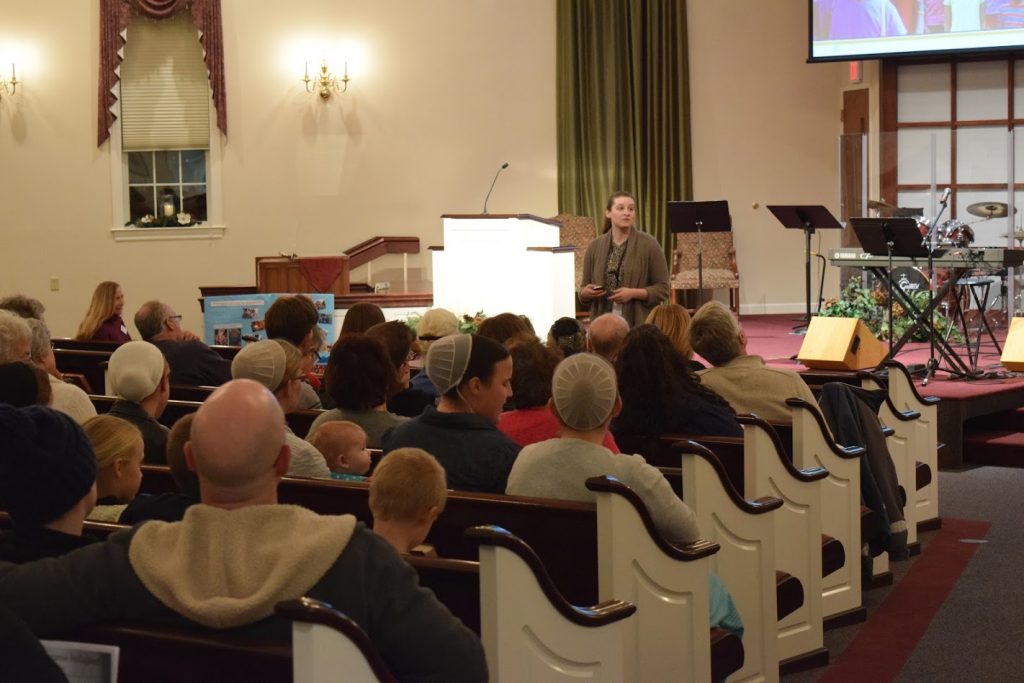It had been two and a half weeks since President Trump’s executive order banning people from seven Muslim-majority countries from entering the U.S. for three months, suspending the U.S. Refugee Admissions Program for four months, and slashing the number of refugees permitted into the U.S. in fiscal year 2017 by more than half.
But despite the uncertainty surrounding the future of refugee resettlement in the U.S., interest in helping refugees seemed higher than ever as over 200 people came to Alive Church in Ephrata, Pa., on Feb. 13, to attend “Welcoming refugees,” an information session organized jointly by Eastern Mennonite Missions (EMM) and Church World Service (CWS).
The information session was led by Christine Baer ’14, Congregational Resource Developer at CWS. For an hour and a half, Baer spoke about refugee facts and statistics, stories of resettlement in Lancaster County, and ways for anyone to get involved.

Baer opened with a simple definition of the word “refugee.” “Refugees are people who flee their country based on a well-founded fear of persecution because of race, religion, nationality, political opinion, or membership in a particular social group, and who are unable or unwilling to return home,” she said.
Baer went on to explain the history of refugee resettlement through the United Nations, the process by which people at risk are given refugee status, and the options people have once they are declared refugees.
Many of the facts Baer shared were sobering. The audience learned that there are 21.3 million refugees worldwide (and 65.3 million displaced people in total), that the average time spent in a refugee camp is 17 years, and that half of all refugees are under 18. They also learned that resettlement in another country is an option for less than 1% of refugees.
Despite the grim statistics, Baer remains optimistic that the Lancaster County community can make a difference by helping refugees build new lives here. Lancaster County is a hub of refugee resettlement, having taken in 1,300 refugees since 2013, according to a report by the BBC.
“The level of welcome and support has been amazing and encouraging to see,” said Baer of Lancaster’s response to refugees.
What can Lancaster County residents do to help? Baer’s answer: donate, educate, participate. To donate, people can find a list of needed household items and a portal to give money at cwslancaster.org. To educate, Baer encouraged the audience to find creative ways to engage with and inform the public about refugees. She also suggested that people find ways to interact with and learn from individuals or families from other cultures.
To participate, Baer suggested that people consider working with CWS to form a Welcome Team for a newly arriving refugee individual or family. Welcome Teams can have varying levels of involvement, from furnishing a home for arriving refugees, to supporting refugees in specific areas like language-learning, finances, and job-seeking for six months. Churches often become involved with refugees in this way: in 2016, 33 local congregations formed Welcome Teams.
People can also volunteer as individuals to help with needs like transportation, health advocacy, and community orientation. Baer emphasized that refugees need an outlet for their hospitality that community members can help to provide. Members of CWS staff are invited to dinner by refugees almost every day, she said.
Baer spent some time talking about Trump’s Jan. 27 executive order and what it might mean for refugee resettlement. She noted that the four-month pause in resettlement programs will actually delay resettlement for many refugees by much longer, since some clearances will expire during that time and refugees will need to go through those vetting processes again. Even when vetting occurs under regular circumstances, getting all approvals normally takes an average of two years, she said.
Baer also said the executive order leaves some refugees who are separated from their families uncertain about whether they will be able to reunite. One woman in Ephrata was supposed to be reunited with her 83- and 85-year-old parents, refugees from Ukraine. Now she is unsure when, if ever, she will see them again.
Baer left half an hour for questions at the end. Audience members asked about the future of resettlement agencies, helping to quell anti-refugee sentiment, and how the number of refugees permitted into the U.S. is determined, among other things.
This was the third event in which Baer partnered with EMM to inform the public about ways to help refugees. A similar information session took place in September 2015, and a session geared specifically toward youth happened in June 2016.
Although the future of refugee resettlement in the U.S. is uncertain at this point, EMM Discipleship Trainer Angie Earl said EMM and CWS are planning to increase their partnership efforts throughout 2017, holding more joint events and possibly finding ways to facilitate more interaction between refugees and community members.
“We are a program attempting to provide hope and new stability,” said Baer of CWS. She spoke with excitement about a local congregational Welcome Team preparing to welcome a Syrian refugee family the next day. The family is able to arrive after a federal appeals court in California temporarily blocked the travel ban.
“You can surprise yourself with the ability to cross divides and seek common humanity,” said Baer.
